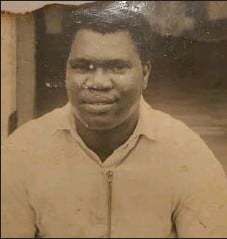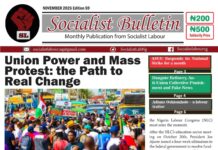Boney Akaeze
Every society is a reflection of the consciousness and dominant ideology of its citizens. It could be consciousness towards religion and spirituality or economic and socio-political well-being. Whichever is dominant and prevalent will be the determinant of the direction of progress for such society. Again; it is also pertinent to acknowledge that the philosophical and ideological current of every period, work in tandem to shape the direction of the overall development of societies.
Modern history is replete with the role social philosophers played in shaping the ideological currents and creating the soul force responsible for positive actions which produced great impacts and enduring social outcomes. Karl Marx and Fredrich Engels for example, built on the dialectical and materialist interpretation of history by Hegel and Feuerbach to espouse their proletarian revolution theory of change. This theory eventually became the philosophical foundation of the Bolshevik revolution in Russia and has remained the intellectual legacy on which the communist and socialist ideologies of modern societal organization revolve.
Nigeria became an independent and sovereign nation-state on October 1, 1960 being the date the British colonialist handed over the government of the country to its indigenous people. The period leading to this historical event was marked by decades of nationalist and anti-colonial struggles. This struggle threw up men and women who played different roles in the efforts that eventually culminated in self-rule for Nigeria. In the course of the decades of struggle for independence, there were different elements and classes of people with different socio-economic and political orientations. There were the radical elements and socialists, the moderates, the conservatives and reactionary as well as the pseudo-bourgeoisies and stooges.
From 1945 and in the aftermath of the new world order thrown up by the exigencies of the end of the World War II, the colonial masters had to change their game from direct colonization to neo-colonialism and imperialism. In Nigeria, as in other colonial territories, the colonial masters worked out the formula for their handover of political power to the indigenous people and strategically ensured that the radicals and socialists were shut out.
In Nigeria, the British authorities craftily prepared the ground for the very conservative local bourgeoisies and their allies to inherit political power from them so that in spite of their having relinquished direct political rule over Nigeria, their imperial influence over the country would be maintained. Sixty one years after independence, the contributions of the radical and socialist nationalists in our anti-colonial struggle and efforts to put our country on a socialist and egalitarian footing have remained an under represented paradigm in the narratives of our national history.
One of such unsung revolutionary heroes who committed themselves to the pursuit of a truly independent Nigeria rooted in a socialist foundation was Chief Nduka Eze. He was born on February 25, 1925 into the Umueze Afadia family of Umuaji Quarters of Asaba in presented Delta State. He grew up in Lagos and spoke Igbo and Yoruba languages fluently. He had his primary as well as secondary school education which he completed in 1944 at the Mission Schools. After his secondary education, he joined the United African Company (UAC) as a Manager-Trainee.
Born in October 1900, Funmilayo Thomas had already become a Head Teacher at the newly formed Abeokuta Grammar School girls’ section at the age of 23, resigning two years later to marry and move to be with her new husband, Reverend I. O. Ransome-Kuti, then head of a more established school in Ijebu-Ode. Having been the first girl ever to enroll at AGS, FRK was determined to ensure that girls had as much access to education as boys, often intervening on behalf of female students in persuading reluctant fathers to send their daughters to secondary school and beyond.
It was at the UAC that the very young Nduka demonstrated his prowess as an astute trade unionist. He became prominent as a national figure in his very youthful age; being in his twenties. He emerged as the Secretary of the Amalgamated Union of United African Company (UAC) Workers popularly known as UNAMAG and a cabinet member of the National Council of Nigeria and the Cameron (NCNC). In 1949, he joined M. A. O. Imoudu; President of Railway Workers Union and F. O. Coker; Secretary of the Post & Telegraph Workers Union to form the Nigerian National Federation of Labour. At this time, he was also the Acting President of the Zikist Movement.
The concept of the Zikist Movement was the brain child of A, A. Nwafor Orizu; a Nigerian student in the United States of America (USA) who had in his book: “Without Bitterness” challenged the people of Africa to a new awakening in the spirit of Renascent Africa by Dr. Nnamdi Azikiwe. The Zikist Movement principally challenged the irreconcilable tribalistic and self-seeking tendencies of the middle class to whom the youth had looked up to for leadership. Richard L. Sklar noted that Eze and his comrades championed the struggle for a national programme of positive action geared towards the redemption of the Nigerian society from social wreckage, extrication from mental slavery as well as ideological mediocrity and confusion.
Nduka Eze had the power of oratory and was exquisite in his understanding and analysis of socialist interpretation of colonialism and the economic and socio-political conditions it fostered. He was a phlegmatic and pragmatic strategist with a fervent knack for social action. He subscribed to neither bigotry nor any form of primordial posturing. He was a practical socialist political activist, an indomitable and indefatigable nationalist and internationalist of the Marxian orientation and a resolute believer in the potency of the youth and working class as the strongest dynamics of social transformation. Along with his other colleagues such as Osita Agwuna, Habib Raji Abdallah etc, Eze was one of the arrowheads of the Zikist Movement; the youth wing of the NCNC. In 1946, the Zikist Movement he served as its Field Secretary, sent him on a political advocacy tour which took him to Kaduna, Zaria, Kano, Jos and Kafanchan in Northern Nigeria, Enugu, Benin-City, Port-Harcourt, Sapele, Asaba, Owerri and Onitsha in Southern Nigeria during which he effectively deployed his oratorical ingenuity and elocution finesse to hold his audience spellbound and bullet into their sub consciousness, the defining philosophy of the new awakening directed at the youth and working people of Nigeria in particular and Africa in general by his Movement. He harped on the necessity and efficacy of radical political action linked to the historic roles of the youth in different revolutionary movements across the world, he emphasized the need for the working class to be courageous and to rise above the fear of intimidation, repression, imprisonment and even death. His thoughts as canvassed during the tour were contained in his article titled ‘The Working Class Movement and the New Awakening which was published in the Nigerian Spokesman in 1947. He stoutly challenged colonialism and imperialism on the grounds that they are driven by external political and economic interest, and sustained by the exploitation of the natural resources and labour power of the colonial and neo-colonial territories and their common people.
Right from 1946 during his days at the UAC where he worked, the Asaba born nationalist, Marxian socialist organizer and irrepressible trade unionist, had nursed the dream of a synergy of the Labour and Political Movements as a strategy towards an emancipatory revolutionary action. He found an opportunity for this dream in 1949 when he found himself in the vantage position of firm control of the Federation of Trade Unions in Nigeria. With this control, he spearheaded a strike against the largest of the British mercantile interests in the country. Eze and his comrades effectively rose up to the condemnation of the Iva Valley Coal Mine tragedy of 1949 in Enugu in which some mine workers were slayed by the Police on the orders of the colonial Chief Commissioner of the Eastern Provinces. Eze’s description of the incident engendered a national solidarity that shook colonial Nigeria with dynamite effect. In active collaboration with Mokwugo Okoye, Eze intensified his campaign for action with the circulation of tracks of “Call for Revolution”. Throughout the anti-colonial struggle Nduka Eze remained very active in leftist political activism in Nigeria. He played very high profile roles in developing and strengthening the capacity of the youth to engage the colonial authorities and push Nigeria to independence as a socialist country.
In 1950 and towards his dream of a socialist post-independence Nigeria, Eze linked up with the Communist Party of Great Britain (CPGB). He established contact with personalities in CPGB such as Harry Pollit, Barbara Ruhemen and Idris Cox etc. He was a pioneer Marxist trade unionist and nationalist in Nigeria. There were other numerous Marxist colleagues of Nduka like Samuel Ikoku, Ayo Ogunseye, Gogo Chu Nzeribe, H.O. Davies, Funmilayo Kuti, Samuel Akpata, Ikenna Nzimiro etc. He was instrumental to the founding of the first Labour Newspaper in Nigeria; “The Labour Champion”. He also helped to link up the Nigerian Labour Movement with the International labour Movement; the International Federation of Labour in Paris. He facilitated contacts which saw the selection of Nigerian students for study in Eastern Germany and Czechoslovakia through the National Scholarship Board formed in 1950 by him and Folarin Coker. Through his effort, over thirty students went for studies in Berlin and Prague between 1950 and 1951. He created and maintained contact with several groups in Europe including the Free German Youth (FGY) which aided him to sponsor several of the young people he mentored to study in Secondary Schools and Universities in East Germany on the auspices of the National Scholarship Board.
Consistently; Eze inspired and mentored young people around him in the intellectual and practical application of Marxist principles to addressing the political challenges in Nigeria. The Labour Movement was his primary constituency. He was able to attract funding support for his National federation of Trade Unions from his contacts with Communist Party of Great Britain (CPGB), World Federation of Trade Unions in Paris (WFTU) and other Communist satellite groups in Europe. He committed himself to the course of the Nigerian working people, he was never interested in tribal or religious cleavages, he was unreservedly ideological and altruistic. He eloquently rejected British colonial policies in Nigeria which he criticized for concentrating wealth in few aristocrats while impoverishing the mass of the people who were actually the producers of the wealth made the preserve of the privileged class. Towards Independence in 1960, Eze and his colleagues in the Zikist Movement intensified their radical activities. They circulated tracks throughout the country calling for revolution and executed a sabotage action which they adopted as a strategy to instigate the colonial authority to such punitive actions that could lead to increased public resentments against the government and unify the indigenous people towards a positive action against the colonial government.
This period was turbulent for Eze and his group. They suffered repression, harassments, denials and betrayals. It was at this point that Eze broke with Dr. Nnamdi Asikiwe and pitched tent with Obafemi Awolowo whom he considered a more progressive politician than Azikiwe. He became leader of the Action Group in the Asaba Provence which extended from Asaba to Agbor in present day Delta State. He was instrumental to the huge success the Action Group recorded in the Provence in the areas of free education and health care, public water supply and other infrastructure. He instituted a foreign scholarship scheme from which a great number of citizens from the Provence enjoyed, notable among whom were men like Mr. Emma Onyemem, the Late Dr Philip Onianwa; the first Nigerian Nuclear Physicist and the Akwue of Asaba and a host of others. It was during his Action Group days in 1950s that he facilitated the establishment of the Asaba General Hospital which has now metamorphosed into the Federal Medical Centre (FMC), Asaba.
After Independence in 1960, Nduka Eze left Nigeria for the United Kingdom for his University Education. He was admitted to the London School of Economics in 1962 where he obtained his LLB Degree and was subsequently called to the Bar at the Inner Temple in 1965. Shortly after his study in England, he returned home to meet turmoil. He hoped to ensure that Nigeria was rooted on such a firm foundation that would guarantee the welfare and happiness for its common people.
The raging storm was inflicted on the country by the reactionaries who were stage-managed into the commanding heights of the newly independent state and who irresponsibly cannibalized and reduced the potentially great country into a buffeted mammy wagon unfit for any meaningful voyage in nationhood. Eze threw himself into the prevailing ominous cloud hanging over the country. He reached out to Chukwuemeke Odimegwu Ojukwu and Chief Obafemi Awolowo as well as other leaders across the country and in his characteristic patriotism and nationalist conviction, spoke truth to power. He later suffered incarceration in the hands of both Ojukwu and Yakubu Gowon. Even though he had used his contacts in Eastern Europe to secure some assistance for Biafra, Ojukwu resented his radical orientation and Gowon had him detained after the civil war as a Biafra sympathizer. Even his wife; Rose Eze was a victim of the Asaba Genocide of 1967.
In the 1970s, this great leader of men settled down to professional legal practice. In partnership with the Late Chief Edwin Umeh-Ezeoke (Speaker of Nigeria’s House of Representative in the 2nd Republic), he established a legal firm called Nduka Eze, Umeh Ezeoke & Co. His legal practice focused on human rights/social justice issues and did much to assist people who lost their properties in the infamous abandoned property edict of the military era. When party politics resumed in 1999, he emerged the first National Secretary General of the Nigerian People’s Party (NPP) and when the NPP split, he remained Secretary General of the Great Nigerian Peoples Party formed by the breakaway faction of the NPP.
All through history, the ruling class has always ensured that socialists who attempted to overturn the balance of power against them are presented as rebels and extremists. They have also always ensured that the ideology behind any revolutionary figure is suppressed and the memories of such personality completely erased or hidden from the coming generations. This is the fate being suffered by Nduka Eze. Those whose class interest his activities challenged are aware that the virtues and ideology he lived for carried with it, such prodigious soul-force capable of setting in motion, the national force that could sweep them away from power and positions of influence. It is therefore the responsibility of the socialist thinkers of our generation to reverse this ignoble trend. We must as a duty and service to our country, ensure that the true heroes of our country are not forgotten. Their legacies must be kept alive for the benefit of future generations. Coincidentally; Comrade Nduka Eze went the way of all mortals symbolically on October 1, 1983 being the twentieth anniversary of Nigeria’s Independence.
As we marked the 61th Anniversary of Nigeria’s Independence which you fought for and shone like a million stars, and as the ideological persuasion you propagated remains more apt than ever, you will always be remembered in affectionate and evergreen memories of your fellow compatriots not as Nduka of titles, estates and other material wealth but as a great soul, a good man who led a simple life and the Working People’s General.
Boney Akaeze
Programs Co-Ord
Centre for Citizenship Capacity Advancement & Development Alternatives (3CADA).
Asaba,
Delta State, Nigeria.






